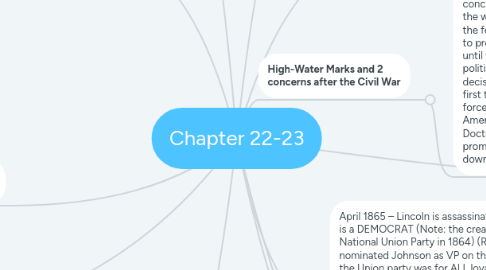Chapter 22-23
by Shelby Caldwell

1. After Emancipation
1.1. Emancipation” in practice was confusing (Uneven responses across various parts of the South). (Example: Where free in one town, you may be “re-enslaved” in another.) African American Freedmen: - Some cases highlighted the loyalty prompted to the slave owner and resisted liberation. - Some cases highlighted joining Union troops to pillage the Masters’ homes. - Changed their names
1.2. Asked to be referred to as “Mr.” and or “Mrs.” - Took to finding their spouse, children and parents - Formalized “Slave Marriages” to legally make children their heirs (any sharecropping or tenant farming acreage to be passed down after death – later). - African Americans provided protection and mutual assistance in the “new towns” - *Exodusters – African Americans who would travel to Kansas. - African American churches were formed – bedrock of AA life.
1.2.1. New Educational Opportunities: - Literacy was denied as a slave - As freedmen , they raised funds for land, building schools and hiring teachers. - *American Missionary Association – provided Northern White women that volunteered for teaching services
2. Presidential Reconstruction
2.1. The INDIVIDUALS left, not the STATES • Lincoln: *Wanted the return to the South to be “QUICK” • *Fed. government will PARDON / Forgive everyone (except Conf. generals) of all charges IF they swear allegiance to the Union.
3. Radical Republicans (Congressional Recon.)
3.1. Small subculture of Republicans that HATE Lincoln / Johnson’s plans for Reconstruction • Led by “Thaddeus Stevens” and Charles Sumner • Original position: (1861) – promoted the “limitation of Presidential power” • MAIN AGENDA: Fight FOR African American rights! (wants African Americans to have full citizenship (14th) and voting rights(15th) – • 15th = most radical / creates a scene that America is now a “trailblazing” country – no other country in the world provided suffrage for freed slaves. THE SOUTH SHOULD BE PUNISHED
4. Black Codes
4.1. Cultural laws passed in the South to hinder the lives of freedmen (not federally funded but is a precursor to the Jim Crow era). • Established codes to regulate the affairs of emancipated African Americans. • Southerners were trying to bring back pre-Civil War times (unequal rights)
5. Civil Rights Act 1866
5.1. Gave African Americans “Citizenship” Rights back Ends the ability for states to pass.... “BLACK CODES” (no more black codes) - severe restrictions on African American lives from 1800 to 1865 Examples: carrying weapons, serving in juries, testifying against whites, marrying whites (Johnson Vetoes this) but Congress overrides MOST SIGNIFICANT PART: For the awareness the South would NOT enforce the claims of the CRA ‘66, provides strength into Amending the Constitution (14th Amendment) would apply more Damaging and stringent punishment from the Feds to the States.
6. Abolitionists’ Harsh/Brutal Reality – freedmen were largely illiterate, without property and unskilled at knowing how to survive as a free culture. • To combat this: The Freedmen’s Bureau was created in 1865. • Congressional assistance to former slaves (provides housing, food, clothing, education, money....) • 2 cultures involved: poor whites and freedmen
6.1. Freedmen’s Bureau
7. April 1865 – Lincoln is assassinated Johnson is a DEMOCRAT (Note: the creation of the National Union Party in 1864) (Republicans nominated Johnson as VP on the note that the Union party was for ALL loyal men) – this Party was created to get Lincoln reelected in 1864)
7.1. Johnson’s Plan
8. Price: $7.2 Million U.S. Hesitation: focused on Reconstruction (monetary issues) Awareness of Natural resources became questionable U.S. Eagerness Honor a reinforcement to the Monroe Doctrine (2) Honor the Russians for being allies to the Union during the civil War.
8.1. The Purchase of Alaska
9. Past Women's’ rights activists would get involved in the abolitionists’ movement to promote the African American culture to prove the likelihood of bridging into Women’s rights (One in the same). - Example: Elizabeth Cady Staton and Susan B. Anthony worked wholeheartedly in The Woman’s Loyal League to gather over 400,000 petitioned signatures for African American emancipation. - Connection to the 14th Amendment: it included the word “male” – upset Women’s Rights leaders. - Connection to the 15th Amendments: they wanted the word “sex” to be included; they lost this battle as well. - 50 years would pass until the 19th Amendment was ratified.
9.1. No Women Voters
10. High-Water Marks and 2 concerns after the Civil War
10.1. (1) (2) High-Water Marks and 2 concerns after the Civil War Ending the war and testing the resilience of the federal government Morality claim to press the 13th amendment / Up until the ratification of the above, politics played the major role in the decision making of slavery. This is the first time “morals” became the driving force. (3) International perception of America is positive due to Monroe Doctrine’s much needed attention to promoting America’s ability to calm down war
11. South (Post War)
11.1. Economy South (Post War) – Banks and businesses closed – Runaway inflation – Factories were smokeless, silent and dismantled – Railroads destroyed Agriculture - Hopelessly crippled - Slave labor system collapsed (13th Amendment) General Southern Culture - White Southerners spoke of “your government” not “our Government.” - Still believed the war was a “just” cause.  
12. Reconstruction Act of 1867
12.1. Abolished governments formed by the Confederacy during the Civil War (R. Republicans stole this idea from Presidential Recon.) (2) This act created “MARTIAL LAW” (just like borders states during the Civil War) / Military Districts in these southern states (Johnson Vetoed this (unconstitutional?) but Congress overrides his veto – It divided the South into 5 military districts. U.S. soldiers would be stationed in each to make sure things stayed under FEDERAL control.


